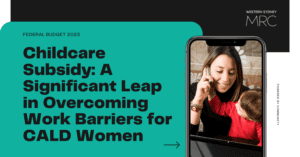Evaluation of the Humanitarian Settlement Services and Complex Case Support Programs
The Liverpool Migrant Resource Centre (LMRC) is pleased to provide this response to the Department of Social Services (DSS) on the EY Evaluation of the Humanitarian Settlement Services (HSS) and Complex Case Support (CCS) programmes. The LMRC’s response, at this time, is focused on addressing the proposed merge of the HSS and CCS programme model, recommendation 5, detailed by EY in the evaluation. The LMRC presents this response with the view of ensuring best practices and outcomes for our client base, in line with our existing client-centred practice and framework. In regard to the remaining recommendations outlined in the report, the LMRC would welcome the opportunity to provide additional feedback at the time DSS provides its response.
The LMRC notes that the current CCS contracts are projected to go to tender this year. It is with consideration of the priority of the impending tender decisions that the LMRC raises the below concerns.
The LMRC works with newly arrived migrants, refugees, and diverse communities by building their capacity to take part in local life in Liverpool and beyond. The LMRC is a community based non-profit organisation established to actively and directly relieve and empower those whose social condition renders them disadvantaged. The LMRC aims to build capacity, capability, competence and independence by actively and effectively assisting in social inclusion & integration through information, referrals, casework, group work, and community development.
Key points addressed in response to the proposed merge include:
- The risk of loss or reduction in efficient, individualised and flexible service provision, particularly for CCS clients
- Under the proposed merge of HSS and CCS programs, the potential for conflation of payment point processes and reduced identification of clients requiring CCS referrals beyond the initial year of settlement
- Under the proposed merge of HSS and CCS programs, the potential risk of loss of expertise of existing service providers
- The potential for lack of continuity of care for clients under the narrowing of CCS provision.
Response to Recommendation 5.
Merge the HSS and CCS programmes
In the long term, the department should review the HSS contract, with the view of merging the HSS and CCS programmes (in accordance with the ‘HSS Plus’ model).
The LMRC welcomes the input of EY to the evaluation of the HSS and CCS programmes, noting that the overall tone of the evaluation reflects programme efficiency and effectiveness. It is evident in the evaluation that the current structure, particularly of the CCS program, meets its objectives in a timely, effective manner. Further, the LMRC welcomes the suggestion of the development of clear programme objectives established in consultation with service providers.
However, the proposal of the merge of HSS and CCS programs raises several concerns for the LMRC, detailed below.
Firstly, given that the overall tone of the report reflects the efficiency and effectiveness of the HSS and CCS programmes, the suggested implementation of an HSS and CCS merge seems unwarranted. To this effect, LMRC holds concerns for the provision of CCS under the HSS model, pertaining particularly to the spectrum of settlement support under which each programme operates. The HSS program focuses on the provision of essential information and a foundational orientation within the initial settlement period (6-12 months). On the other hand, the strength of the CCS program is based on the capacity for flexibility and individualised response to complex issues throughout the full five (5) years of settlement. The delivery of these distinctly different programmes under a single provider that is only engaged with clients during the initial settlement period has the potential to shift the focus of CCS to those within the initial settlement period and reduces the likelihood of clients requiring CCS services being identified beyond the HSS contract period. As indicated in figure 41 of the evaluation, the Settlement Support Programme (SSP, formerly Settlement Grants Programme) now remains one of the highest referrers to the CCS program, indicative of the ongoing and developing complexity throughout the full settlement period, up to five (5) years. This referral pattern strongly suggests that the consideration of a merge would need to account for the ongoing, expansive nature of CCS referrals outside the initial year of settlement.
While the EY report suggests the HSS Plus model would provide better continuity of care between HSS and CCS services, the LMRC posits that the recommendation for the merge has the potential to have an overall adverse impact on the continuity of care and support across the refugee settlement spectrum. The recommended merge would arguably see clients engaging with fewer services over a shorter duration of their settlement into Australia, based in potentially geographically challenging locations that may impact upon accessibility. This issue would be heightened further should EY’s recommendation of also reducing the number of HSS providers be adopted.
The LMRC would like to gain a response to concerns pertaining to the management of HSS and CCS under the proposed merge, particularly regarding whether they would be managed as separate programmes to maintain each of their strengths and capabilities.
Whilst EY notes several points on which the merge would benefit DSS throughout the report, the shift of service provider expertise under the merge is not adequately accounted for. As the report outlines, the efficiency and effectiveness of the CCS program are centred on the expertise of service providers with the capacity to deliver individualised, nuanced complex casework. The LMRC holds concerns for a significant loss of existing skills and expertise under the proposed merge and projects that will have a substantial long term cost on DSS if not accounted for.
It is noted in the EY report that the HSS and CCS programmes are distinct in their roles. The provision of each programme relies upon the unique skill set of providers that is markedly different between the HSS and CCS programmes. The approach to casework also differs significantly, and as outlined in the EY report in section 3.2.2, there is broad recognition that not all clients received tailored support under HSS given the structure and relatively prescriptive nature of the HSS programme. Merging the two programmes presents a concern as to the impact upon the tailored nature of CCS service delivery that is at the core of its success. The structure of the CCS programme lends its success to localised providers with specialist skills and experience in tailored intensive and complex case management. Thus, the recommended merge raises some concerns for the LMRC as to the impact upon service provision and the potential impact on positive client outcomes under the HSS and CCS programmes.
Conclusion
LMRC appreciates the opportunity to provide comment on the Evaluation of the Humanitarian Settlement Services and Complex Case Support Programmes report. Whilst the LMRC holds serious concerns over some aspects of the report recommendations, the overall tone of the report is one that DSS can be duly proud of. LMRC makes this response for DSS’ consideration in analysing and actioning the report’s recommendations.
The LMRC looks forward to the opportunity to view and respond to any government response or implementation of recommendations stemming from the report.
Kamalle Dabboussy, CEO







